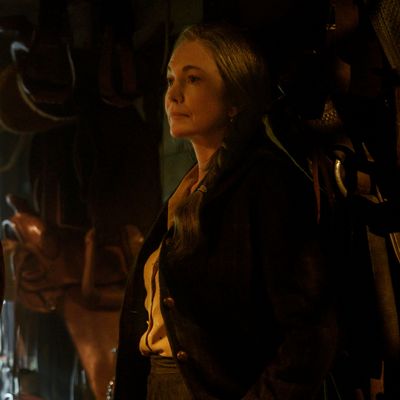
Kevin Costner is one of our great cinematic martyrs. Even if he doesn’t die in a movie, he must almost always suffer — nobly. In his early years, he was able to cross a ’90s-male sensitivity with an aw-shucks, Gary Cooper–esque machismo; that mixture was the secret to his stardom, and both prongs of that persona lent themselves to a low-key melancholy. As he’s aged, he’s become gruffer, and a bit more sturdily macho. But the Costnerian suffering remains — whether he’s being whisked away by an inopportune tornado in Man of Steel, or battling cancer in the action thriller 3 Days to Kill, or just being Jessica Chastain’s regretful father in Molly’s Game. He’s still beautiful when he’s sad.
In Let Him Go, Costner and Diane Lane play an aging couple, George and Margaret Blackledge, who decide to try to get their young grandson back from the shady, rural family that has claimed him. It has the makings of a schlocky, violent thriller, but with those two graceful stars, it becomes more elegiac Western romance than shoot-‘em-up. It begins in loss: George and Margaret’s son, James, dies in a horse-riding accident on their ranch, leaving his young wife Lorna (Kayli Carter) a widow and his baby boy Jimmy fatherless. Not long after, Lorna — who seems to shrink under Margaret’s occasionally judgmental gaze — marries another man, Donnie Weboy (Will Brittain), who not only seems to be an abusive scoundrel, but immediately whisks her and her child away to North Dakota without telling anybody. Shocked and furious, Margaret hatches a plan to drive to North Dakota, track down Donnie’s family, and get young Jimmy back. George is skeptical, but he tags along, partly because he hopes to convince her not to go forward with this, and partly because he’s a devoted husband, and he’s not about to let his angry wife drive off to North Dakota by herself.
Their journey is a solemn one, and the land they drive through one of meadows, forests, mountains, and lonely highways, almost as if this aging couple had become just another part of a vast natural landscape. They talk about how they’re not young anymore. They talk about loss and letting go. (That title will work on several different levels by the film’s end.) They talk about just what exactly Margaret thinks will happen when she tries to get Jimmy back: Does she really think they would be able to raise a young child? Their back-and-forth feels like a dialogue between two people reconciling themselves with the passage of time, and with the fact that their days on this Earth are numbered.
But it’s not grandiose or pretentious. Writer-director Thomas Bezucha, adapting Larry Watson’s novel, finds ways to hint at the couple’s inner life. We sense the tension between them when George buys himself a drink at a liquor store along the way — and because it’s so momentary, it gets us wondering about what the full story there might be. A brief exchange about a horse Margaret had when she was younger nearly paints us a whole picture of her childhood. Memories of young James haunt them in different ways: Margaret is animated and driven when she thinks of her dead son, while George seems to want to pull back; you sense that he’s the kind of guy who keeps things buried and is uncomfortable with overt displays of emotion.
And then, the movie goes bonkers.
Once the Blackledges arrive in North Dakota and track down Donnie’s family, the great Lesley Manville shows up as the Weboys’ fire-breathing matriarch Blanche, and the film becomes a test of wills between this violent backwoods clan and our genteel heroes. A test of wills, and maybe competing visions of life: Talking about the rough life her family has had out in the Dakotas — they were homesteaders who suffered all types of loss as they battled poverty and the elements — Blanche seems to justify the hardness and brutishness of her people, and herself. Manville plays this zealous, complicated beast with such over-the-top bravado that you can’t tear your eyes away from her. It’s almost like the movie is playing a joke on its two forlorn, subdued stars. And maybe it is: Blanche’s crude garrulousness makes a sharp contrast to the Blackledges’ reserve. And it shakes Costner’s George out of his reverie and regret, teaching him that there are some things worth fighting for.
The story of Let Him Go, on paper, might not sound like much (I haven’t read the novel, however, and the film makes me want to), and the relative austerity of this underpopulated, mostly quiet movie might not seem at first like it will be too rewarding. But the patient, somber direction gives the characters — and the actors playing them — room to breathe. It lets them do the things they’re best at: Costner gets to be the sad dad. Diane Lane gets to be passionate. And Lesley Manville gets to eat up the screen. For all its surface simplicity, Let Him Go is a surprising emotional roller coaster, and it stays with you.
More Movie Reviews
- The Accountant 2 Can Not Be Taken Seriously
- Another Simple Favor Is So Fun, Until It Gets So Dumb
- Errol Morris Has Been Sucked Into the Gaping Maw of True Crime


